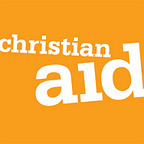Going ‘vertical’ is critical for success in accountable governance
Achieving sustainable and replicable change through accountable governance
Christian Aid’s Temitope Fashola and Charles Gay explain how one project in Nigeria found ways to overcome some of the challenges facing development agencies
In recent years, absolute poverty and inequality has been rising in Anambra State in southeastern Nigeria. This was due partly to ineffective governance and the poor delivery of public services.
Accountability programmes, which tried to address these challenges, had been run in Anambra before — including Christian Aid’s own Power to the People (P2P) project — but none had achieved significant or lasting impact state-wide.
Therefore, when the Voice to the People (V2P) project began back in 2013, there wasn’t great precedent for success.
Five years on, V2P has achieved remarkable change not only in citizen engagement with budgeting and planning of community projects in Anambra, but also in state government responsiveness and public service delivery.
Voice to the People
V2P was launched to promote good governance in 48 communities across 12 local government areas through citizen-driven development and accountability.
The project aimed to:
- support communities and civil society to establish dialogue between citizens and the state;
- increase citizen voices and participation in governance;
- support communities and civil society organisations to effectively hold their leaders to account;
- and improve government responsiveness and service delivery
V2P has proved to be an effective and low-cost approach to strengthening local governance and linking these successes upwards to people and processes at the state level.
Project donor, the UK Department for International Development (DFID), granted V2P its maximum evaluation score of A++.
So, what went right? And what are the essential ingredients that Christian Aid, and others, can take from Anambra to their accountable governance work in other states of Nigeria and beyond?
Avoid local bottlenecks
From previous projects we knew local isolated initiatives would not be enough.
Many local governments and traditional rulers were either corrupt, ineffective or simply did not have the resources to respond to citizens’ demands.
On other occasions, patronage relationships saw government respond only to favoured communities.
Community collaboration to overcome these bottlenecks was not quite there. ‘Vertical’ scale up to state level was critical.
First, V2P began working with communities. Small committees were formed and community-based monitors selected to mobilise people.
Gender and power analysis tools ensured priorities came from both women and men. Priorities were then collected in community Charters of Demand.
Mobilisation expanded horizontally across individual communities and local government areas through a Community Empowerment Network.
By developing horizontal links, communities were better positioned to monitor state-wide programmes and bypass local inefficiencies.
Only when citizens were ready, did selected demands go up to the state authorities — what is known as ‘vertical integration’ (Jonathan Fox, Scaling Accountability, 2016) or ensuring accountability at higher levels of governance.
Forge complementary partnerships
Every V2P partner contributed a key element.
Local Justice, Development and Peace Commissions, with their links to the Catholic Church, brought in the trust citizens needed to believe in the initiative and create a culture of demands.
They also facilitated the selection of monitors or facilitators of priorities. Development in Practice (DiP) ensured a women’s rights approach was embedded, while partners Civil Rights Concern (CRC), the Centre for Leadership, Strategy and Development (Centre LSD), and collaborations with the DFID-funded SAVI (State Accountability and Voice Initiative) programme, helped identify issues beyond local government capacity and ensured direct communication and buy-in from state authorities and the media.
Context and opportunities matter
The political context in Anambra was open to V2P’s focus on soft policy issues where quick wins could be made — such as health, education, and agriculture — and citizen participation.
The 2014 local elections gave V2P a valuable opening to mobilise citizens and reach out to candidates.
There has been a marked increase in citizen voice and engagement in the planning and monitoring of government projects and services, as well as improvement to service delivery.
Anambra State’s Ministry of Economic Planning and Budgeting reported a rise in budget allocations to social development from 12% in 2014 to 21% in 2015.
Insider opinions consider that this has reflected in part, the unprecedented government response to community Charters of Demands, a V2P-created tool.
Through these charters, 23 communities made demands for spending on education and 29 on health, with 52 and 77 items approved respectively.
The agriculture state budget also accepted requests from 22 communities and many of the 29 requests made on roads, water and sanitation also received positive official budget responses.
Actual spending on social development also improved relative to funds budgeted.
Of course, it wasn’t all plain sailing. Reaching consensus on community priorities was not easy and formal budget spaces, even at state level, could easily be co-opted by direct patronage from authorities.
Just as important as getting budget for community demands is monitoring the spending of those budgets.
V2P’s most important gains have been in vertical integration, leveraging community-level mobilisation and horizontal alliances to shift power in the interest of more accountable governance.
Using power analysis to discover how unequal power relations cause accountability failures, V2P has made strides towards institutionalising the kind of transparent mechanisms that enable a shift in power from traditional leaders and other elites into the hands of communities.
For a full report on the approaches and achievements of Christian Aid’s Voice to the People project in Nigeria, Doing Accountability Differently: A ‘Vertically Integrated’ Approach click here.
Temitope Fashola is Governance Programme Manager for Christian Aid in Nigeria. Charles Gay is Christian Aid’s Global Programme Advisor, Governance.
